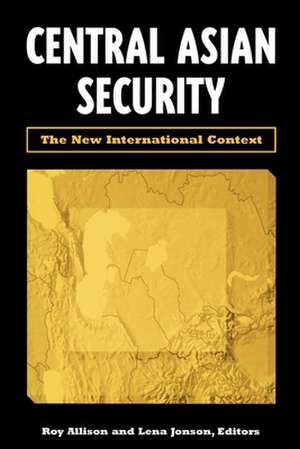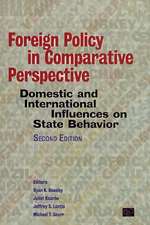Central Asian Security: The New International Context
Editat de Roy Allison, Lena Jonsonen Limba Engleză Paperback – apr 2001
This volume is the first comprehensive scholarly analysis of the strategic reconfiguration of Central Asia as Russia has become more disengaged from the nations in the region and as these nations have developed new relations to the south, east, and west. The international implications are enormous because of the rich energy sources—oil and natural gas—located in the Caspian Sea area. The authors assess a variety of internal security policy challenges confronting these states—for example, the potential for conflict arising from such factors as a mixed ethnic population, resource scarcity, particularly in relation to water management, and an Islamic revival. They also examine the security policy content of relations between the Central Asian states and regional and international powers—specifically the stakes, interests, and policies of Russia, China, Iran, Turkey, and the United States. These internal challenges and the evolution of relations with external powers may result in new cooperative relationships, but they may also lead to destabilizing rivalry and interstate enmity in Central Asia. It is important to identify new patterns of relevance for future security cooperation in the region, but the potential for a new security system or for new institutions to manage security in the region remains uncertain. These issues are explored by a team of prominent specialists from Western Europe, the United States, Russia and China.
Preț: 206.62 lei
Nou
Puncte Express: 310
Preț estimativ în valută:
39.54€ • 41.28$ • 32.72£
39.54€ • 41.28$ • 32.72£
Carte tipărită la comandă
Livrare economică 04-18 aprilie
Preluare comenzi: 021 569.72.76
Specificații
ISBN-13: 9780815701057
ISBN-10: 0815701055
Pagini: 296
Ilustrații: black & white illustrations
Dimensiuni: 152 x 229 x 19 mm
Greutate: 0.43 kg
Ediția:New.
Editura: Brookings Institution Press
Colecția Brookings Inst. Press/Chatham House
ISBN-10: 0815701055
Pagini: 296
Ilustrații: black & white illustrations
Dimensiuni: 152 x 229 x 19 mm
Greutate: 0.43 kg
Ediția:New.
Editura: Brookings Institution Press
Colecția Brookings Inst. Press/Chatham House
Notă biografică
Roy Allison is head of the Russia and Eurasia Programme at the Royal Institute of International Affairs in London: He is the coeditor of Security Dilemmas in Russia and Eurasia (RIIA, 1998), the editor of Challenges for the Former Soviet South, (Brookings /RIIA, 1996), and coauthor of Internal Factors in Russian Foreign Policy, (Oxford University Press, 1996.) Lena Jonson is a senior research fellow at the Swedish Institute of International Affairs. She is the author of Keeping the Peace in the CIS: The Evolution of Russian Policy (RIIA Discussion Paper, 1999), Russia and Central Asia: a New Web of Relations (RIIA, 1998), and coeditor of Peacekeeping and the Role of Russia in Eurasia (Westview Press, 1996.)
Descriere
A Brookings Institution Press and Chatham House publication
This volume is the first comprehensive scholarly analysis of the strategic reconfiguration of Central Asia as Russia has become more disengaged from the nations in the region and as these nations have developed new relations to the south, east, and west. The international implications are enormous because of the rich energy sources—oil and natural gas—located in the Caspian Sea area.
The authors assess a variety of internal security policy challenges confronting these states—for example, the potential for conflict arising from such factors as a mixed ethnic population, resource scarcity, particularly in relation to water management, and an Islamic revival. They also examine the security policy content of relations between the Central Asian states and regional and international powers—specifically the stakes, interests, and policies of Russia, China, Iran, Turkey, and the United States.
These internal challenges and the evolution of relations with external powers may result in new cooperative relationships, but they may also lead to destabilizing rivalry and interstate enmity in Central Asia. It is important to identify new patterns of relevance for future security cooperation in the region, but the potential for a new security system or for new institutions to manage security in the region remains uncertain. These issues are explored by a team of prominent specialists from Western Europe, the United States, Russia and China.
This volume is the first comprehensive scholarly analysis of the strategic reconfiguration of Central Asia as Russia has become more disengaged from the nations in the region and as these nations have developed new relations to the south, east, and west. The international implications are enormous because of the rich energy sources—oil and natural gas—located in the Caspian Sea area.
The authors assess a variety of internal security policy challenges confronting these states—for example, the potential for conflict arising from such factors as a mixed ethnic population, resource scarcity, particularly in relation to water management, and an Islamic revival. They also examine the security policy content of relations between the Central Asian states and regional and international powers—specifically the stakes, interests, and policies of Russia, China, Iran, Turkey, and the United States.
These internal challenges and the evolution of relations with external powers may result in new cooperative relationships, but they may also lead to destabilizing rivalry and interstate enmity in Central Asia. It is important to identify new patterns of relevance for future security cooperation in the region, but the potential for a new security system or for new institutions to manage security in the region remains uncertain. These issues are explored by a team of prominent specialists from Western Europe, the United States, Russia and China.


















